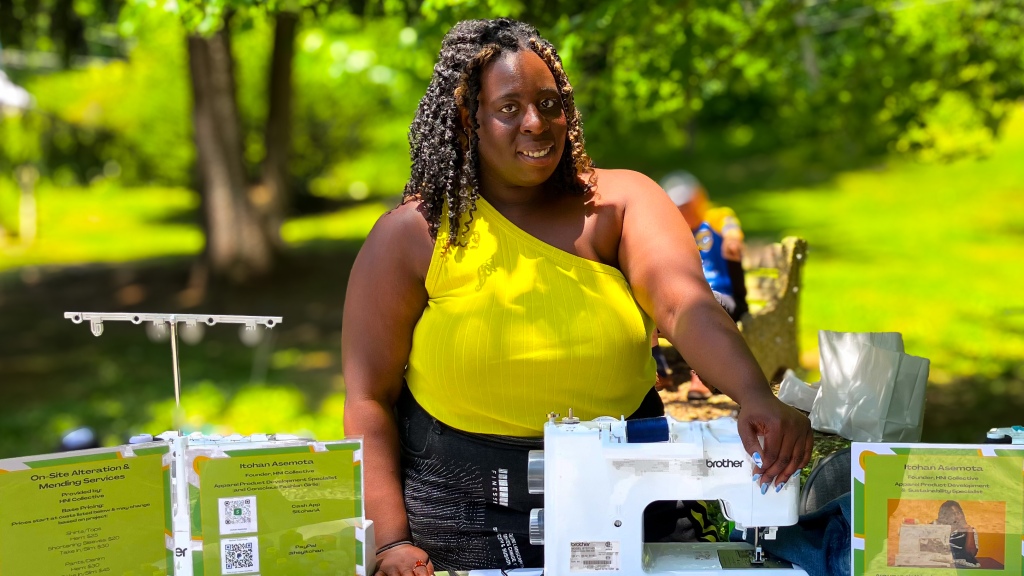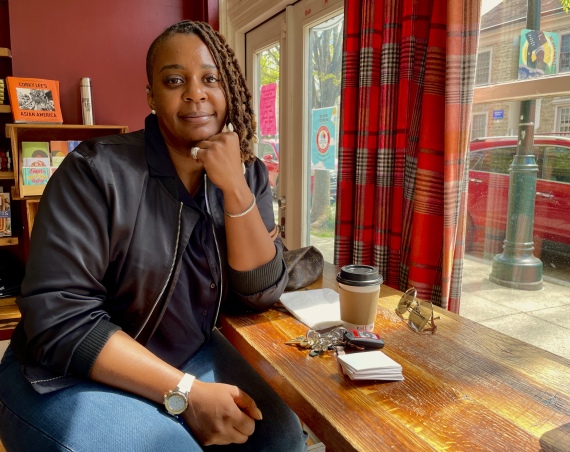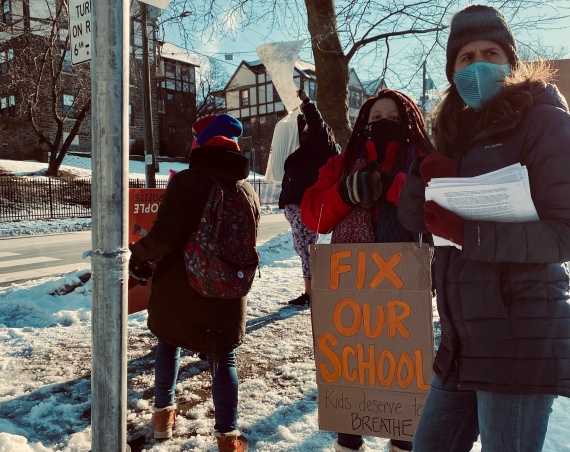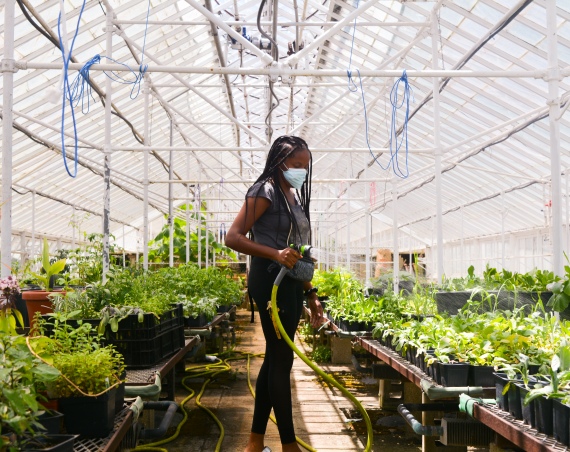Itohan Asemota’s fashion service agency challenges throwaway culture by making sustainable, ethical, and size-inclusive fashion accessible through workshops, consulting, and pop-up repairs.

As vendors at the Historic Rittenhouse Town Fair in early June bore the heat to sell their handmade crafts, foods, and vintage wares, Itohan Asemota’s booth was different from your typical day market scene: a table full of portable sewing kits, a sewing machine, and an ironing board.
While some shoppers may go out looking to buy new (or gently used) threads, Asemota’s HNI Collective is ensuring people will love their clothes again and again by bringing mending and alterations services straight to them.
“Sustainability isn’t just buying a bunch of organic cotton t-shirts to throw in your wardrobe,” Asemota said. “It’s keeping the things you love as long as possible.”
The Germantown resident’s passion for fashion began as a kid, flipping through clothing catalogs of popular brands.
“I remember getting the LimitedToo catalogs when I was eight or nine years old and actually sketching out the individual garments and colorways,” Asemota said.
As she grew older, she took sewing classes in high school to develop her skills, not only out of interest but also necessity.
“Considering the fact I’ve been plus size my entire life, I was always used to altering things in some way, shape, or form, and that’s where my spark for fashion came from.”
Asemota’s initial spark for fashion never burned out, and her childhood interest transitioned into a serious pursuit when she made the decision to study fashion design at Thomas Jefferson University (formerly known as Philadelphia University).
“That allowed me to get the base to take the ideas of potentially going into fashion and turn it into a tangible concept,” she said.
Upon graduating in 2017, Asemota began to work with local brands such as Grant BLVD and Showday Designs doing small batch production, design assistance, and later, towards sustainable supply chain management.
After spending years supporting other brands and businesses to expand her reach, Asemota officially launched HNI Collective this past April.
These services include:
- Clothing mending and alterations
- Small-batch garment production
- Ethical and sustainable fashion consulting
- Fit assistance for plus and extended sizes
HNI Collective does not have a brick-and-mortar available for customers at the moment, but clients can arrange a pickup or drop off with Asemota or swing by a pop-up event she’s tabling at. So far, she’s served others at events such as Green Philly’s Eco-Fair and the Resource Exchange’s reFlea Market since launching.
“Some things that have really inspired me is seeing mending clubs that are popping up,” Asemota said. “That’s really what sparked the idea of me taking our machines and mending on the road.”
The mobile services have given her the opportunity to meet people where they are, both physically as well as in their fashion journey, and provide an opportunity to educate.
“Before buying anything, you should be holding onto whatever you have, buy secondhand whenever necessary,” Asemota said. “And then, if neither of those things correlate for you at that time being, then buy something new.”
Asemota has also built a platform for herself on social media, amassing over a thousand followers on Instagram and TikTok, respectively.
In her videos, in addition to showing behind-the-scenes clips of her sewing process, Asemota would often share tips on plus-size thrifting, how to resist impulse shopping, and advocating for brands to include more size-inclusive options.
“Some of the interesting pinpoints are really the intersectionality, sustainability, and plus-size clothing and where you’re able to find yourself within that niche,” Asemota said.
Through her platform, she has been able to have honest conversations with her followers on the difficulties of being sustainable when it isn’t always accessible and how to find alternatives.
“When it comes to finding sustainable brands or clothes in general for plus-sizes, if it feels like it’s not easy, it’s not,” Asemota said. “What’s happening a lot is everyone is screaming ‘Be more sustainable,’ but for people in larger bodies, that is not as simple a pathway.”
But what exactly makes a brand or clothes ‘sustainable’? With the prevalence of greenwashing, a term used to describe the act of conveying vague, misleading, or false statements about a product or business’s environmental benefits or eco-friendly practices, it can be confusing to know what is legitimately sustainable.
From a fashion and apparel production standpoint, she defines sustainability as what materials are being used, how materials are being used, and how much. Asemota also notes that sustainable fashion often gets conflated with ethical fashion, which she defines as relating to the people and labor behind the things being created, but she intentionally separates the two terms.
“What a lot of greenwashing literature happens now, they’ll say something is made from 20% recycled polyester, but the rest is regular polyester, and then we’re still making 100,000 units knowing that brand can only sell 20,000,” Asemota said. “A lot of the labor behind those clothes are people not being paid fair wages. That’s why I separate sustainable and ethical because you can make organic cotton sweaters and or a pack of wool sweaters but still be using underpaid labor.”
To guarantee that her business is aligning with her values on sustainability, the materials she sources are usually deadstock–fabrics from factories and warehouses usually leftover for being overestimated, out of season, and unsold for a long time.
She’ll source locally as much as possible by patronizing businesses such as Germantown’s Gaffney’s Fabrics, which sells deadstock, and FabScrap in South Philly. From there, she’ll search for other local deadstock suppliers in the tri-state area.
“It’s always local first and then branch out,” Asemota said.
While changing practices in the supply chain and production can promote sustainability, ultimately, Asemota believes the industry as a whole needs to make less stuff.
“The fashion industry is one of the top three polluters in the world right now, but we don’t think about it because we think, ‘Oh, it’s just a crop top,’” Asemota said. “But then we have billions of crop tops sitting in Chile, and a major part of that is what the industry does, ‘we want you to over consume so we can justify overproducing.’”
Asemota also challenges shoppers to change their habits and reject the pressure of throwaway culture to buy things immediately and excessively.
“Consumers have a lot more power than they think they do,” Asemota said. “The reason why you feel bombarded nonstop is because brands are telling you that you need to buy things all the time… You don’t need to buy it now, and if you do buy it, hold onto it.”
If Philadelphians want to develop their own sewing skills or support organizations already doing the work, Asemota recommends the following local options:
- Cut and Sew PHL, a fabric shop in Mount Airy which also teaches sewing classes
- Mt. Airy Learning Tree, a nonprofit community-led skill-sharing space
- Sew Inclusive, a sewing community group for plus-size
- Sewqueer Sewing Collective, a virtual sewing group for the LGBTQIA+ community
- Spokes & Stitches, a Germantown fashion pattern maker, also teaches sewing and patternmaking
- Touch Threads, a sustainable fashion designer based in Germantown
“A lot of the community aspect of ‘let’s sit down and figure out how to fix this for ourselves’ is a major inspiration for the work that I do now,” Asemota said.
If you want to make your clothes last a little longer, find pricing here and request alterations and mending from Asemota here. You can also join HNI Collective and Spokes & Stitches for the Anti Fast Fashion Club’s screening of the HBO documentary Brandy Hellville on July 21.



